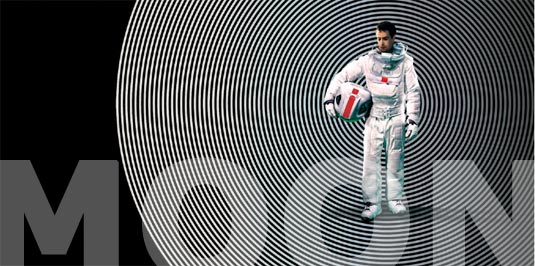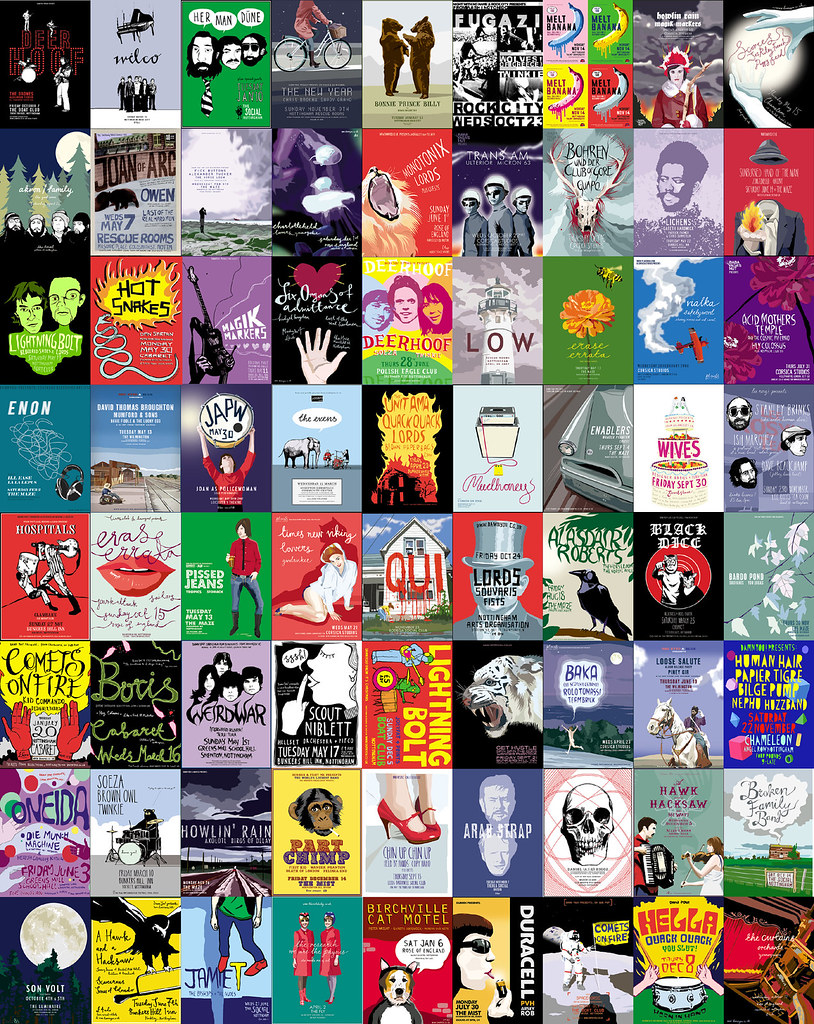Moon
Posted: September 22nd, 2009, by Chris S
I hate going to the cinema. I think it must stem from some long-suppressed childhood memory. Maybe I was flashed at? Who knows. All I do know is that being made to endure the ticks, rustles, coughs, chomps, nasal whistles, mobile phone beeps and whispered questions of a room full of strangers (not to mention all of the above from myself too) is close to a form of torture for me. So I rarely go. I especially rarely go and see a science fiction movie.
My primary problem with movies of the genre is that they’re invariably made by people who have an interest in details. It’s understandable. In order to create a believable futureworld you have to be able to consider every last detail to make this vision believable. You have to think how door hinges would work in the future, how tin openers would evolve, how you’d take a dump in zero gravity and so on or your film will just end up being the subject of a very detailed website pointing out the flaws and contradictions in the science involved and people who go to fan conventions would laugh at you. And, most importantly for me, you’re saddled with a film that lasts 17 hours and 17 hours is a long time to spend in the cinema.
So why the hell did I end up watching Moon, the directorial debut by Duncan Jones (aka Zowie Bowie, son of the Thin White Duke)?
It wasn’t just because it was free.
It’s because the cosmos lights something up within me. I can stare at well-taken images and film of the solar system and our own planet for ever. The recent BBC documentary James May At The Edge Of Space made me cry. I share most pre-pubescent boys’ dream of being an astronaut but it’s not to boldly go where no man has gone before but just so I could sit there and look at Earth in one frame of my eyesight and in total peace and silence. Imagine it. So I went along figuring that, if nothing else, I’d get to see some beautiful shots of the Moon and Earth whilst sitting in a comfortable chair.
What I actually got was totally unexpected. For starters, this is a very compact and minimal film, weighing in around the length of your average John Hughes flick at just over 90 mins.
This has been achieved by completely stripping the science fiction elements down to simple offerings of only the most important information. You know the central character Sam Bell (played by Sam Rockwell) is on a 3 year employment contract to man a space station on the Moon and oversee automated processes to mine Helium 3 from the soil. That’s about as far as the tech side of things gets. You see machines work and processes happen and quickly understand that the details are somehow not important and that you should concentrate your efforts elsewhere and that being wowed by a person’s vision of the future is not Jones’ aim here.
The great thing about this film is that it manages to completely capture what it is about the moon that fascinates us but yet scares us too. This sense of the unknown, of a freedom and ambiguity that is both very liberating and very oppressive too. The juxtaposition of tight, strip-light-lit claustrophobia and this overwhelming sense of space that the surface of the moon has gives the film a strange and creepy quality. Jones has been careful to restrict the number of locations that the film is set in to accentuate these feelings of contrast and subtle touches like the repeating refrain of the music help to bring about a dream-like state in the viewer that allows you to accept some of the films more peculiar moments as being conceivable.
The mid-section of the film is willingly given over to this feeling of peculiarity and confusion as the routine of Sam’s existence gets abruptly broken when he crashes his lunar mining truck after seeing the vision of a young girl in his path on the moon’s surface. He comes round in the medical bay, tended to by the onboard robot GERTY (voiced by Kevin Spacey) and then impulsively wants to get outside of the space station where he eventually stumbles across himself, unconcious in the lunar truck you presumed he had been rescued from.
Any other science fiction film would have force-fed you so much information by this point that, as the viewer you would probably understand that what is occurring is that 2 clones of the same man (unaware that they are clones) are coming face to face with each other. As it is, Jones’ embracing of the sense of the vague and the mysterious means you never quite accept that solution even when it slowly dawns on the duo of Sams that this is the case and that the weekly correspondence with their “family” is pre-recorded and that the reason they can’t contact Earth is not due to a malfunctioning transmitter but because the people who cloned them and put them there don’t want to them to know the truth.
Throughout, Jones comes back to this theme of humanity shining through even the coldest and bleakest situations; shining through where they should be no humanity there. The messages Sam hears from the bosses of the mining company are noticeably less tender than the robot voice of GERTY and when the realisation hits the ‘old’ Sam that he is a clone and he tries to hack into the computer system to check CCTV tapes it is GERTY who helps him do it. The tapes themselves reveal a succession of Sams, each growing more thrilled as time draws closer to the end of their 3 year spell and they view the same pre-recorded messages from their family and long to return to Earth. Each growing more ill in the week leading up to the conclusion of their contract as some pre-installed disease eats them up. Each climbing into a pod to be returned to Earth only to be vapourised and a new Sam delivered from a stock of hundreds in the depths of the station to awake, dazed and as though having been in an accident and with the necessary memories of their arrival and their life on Earth pre-implanted in their brain.
Rockwell shines here, conveying complete deflation of an already struggling person with a subtlety that is hard in a film where you play both the central characters.
It’s far from perfect though. This idea of space bringing about feelings of helplessness is nothing new – in fact, it could be argued that the basic premise for this film is pretty much Red Dwarf right down to HOLLY/GERTY. Also, working in the realm of space travel, human beings as alien forms and cloning is hardly fresh ground when your Dad is David Bowie and some of the visual elements, appealing though they are, are straight from the Stanley Kubrick school of font-obsession and creating futuristic environments from source material that we understand as being from the past.
I also have a problem with the ending. The pair of Sams work out a way of blasting the ‘original’ Sam back to Earth in a pod before the help team arrives to fix the crashed truck and discovers them both there. In the end, the illness that overtook each of his predecessors finally gets him too and it’s decided that the ‘new’ Sam should be the one to go in the pod. It seems to me that they go to great lengths to give any future clones a better chance of working out their situation and I read this as being because they don’t know if the pod will get back to Earth OK or not. I like this ambiguity and it seems deliberate.
There is a beautiful moment where the ‘original’ Sam dies just after he sees the pod with the ‘new’ Sam blast itself off the moon and into space. You understand somehow that because they’re clones it doesn’t matter which of them makes it back and in effect it’s just Sam Bell returning to Earth and not one version or another. You also accept that the pod maybe won’t make it, but the next clone of Sam might work out a better way, or the next clone, or the next clone and so on and so on…
This makes the voiceover from a talk show (in which Sam is exposing the conspiracy upon his return) that has been overdubbed over the shots of the pod approaching the Earth’s atmosphere a little too neat for a film that has been built, up to that point, on deliberately shaky foundations. It feels like this was tacked on at the behest of a focus group or to conclude the film more completely when it didn’t need it.
Having said that, this is a fantastic film. Rather than being a science fiction movie and dealing with detail and technological wonders in order to astonish an audience, it’s a supremely touching story about how important the past (memories) and the future (hope) are to establishing exactly what it is that makes a human being human. Even though the memories that Bell has are fake they are still memories and even though he/they understand that they are clones they still have a human instinct to help and to protect each other and most importantly to return home – even if they’ve never been there before.
You feel this compassionate instinct too in a sense of profound upset when you realise the videos of a family that are keeping Sam sane and motivated are of a family long-gone, of a family he never really knew. You really feel for him and how utterly alone he is and how utterly pointless his existence is too. Let’s not forget you’re feeling this about a film in which the 3 central characters are 2 clones and a robot.
Like I said, this is a film about humanity where there should be none.
If Jones is going to show the same level of compassion and warmth in all his movies then consider me a fan.




